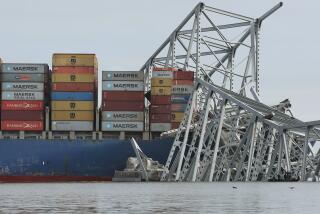Record of Risk-Free Transportation Torpedoed by Denver’s Experience
- Share via
WASHINGTON — Although military officials say their shipments of munitions and hazardous materials over the nation’s highways do not threaten heavily populated cities, there have been some notable exceptions. Denver is a case in point.
On the morning of Aug. 1, 1984, a cargo truck carrying six Navy torpedoes overturned and slid 104 feet down an exit ramp near the intersection of Interstates 25 and 70--known as “the mousetrap” because of the estimated 250,000 cars a day that pass through it.
Panicked police and fire officials shut down the busy intersection in all directions for eight hours, causing a massive traffic jam beginning at the height of the rush hour. But that was just the beginning of Denver’s problems.
Local emergency officials saw fluid leaking from the truck but had no idea what it was. When they dialed a 24-hour emergency hot line that had been provided by the trucking company, there was no answer. It took U.S. Army officials more than three hours to arrive at the scene, even though they were stationed at a base less than 90 miles away.
Several hours later, the torpedoes were finally removed. Although there were no injuries, more than 60 people had to be evacuated. Federal officials disclosed that the military cargo contained toxic propellants and up to 3,930 pounds of explosives.
Denver officials were angered that such a shipment had been sent through the city and passed a law requiring the military to use a route skirting their community. Subsequently, the Colorado Legislature passed a bill designating special routes for military truckers through the state.
“Our experience shows that no one in Washington is really looking at the big picture of military shipments going through cities,” said Tony Massaro, Denver’s director of environmental affairs. “There’s a requirement in federal law that these shipments avoid big cities . . . but nobody follows it.”
The only solution, he added, is for local governments to look out for their own interests.
“Many communities could be vulnerable to this kind of accident,” Massaro said. “The military says they have a very good safety record. But then again, the airline industry says the same thing.”
More to Read
Sign up for Essential California
The most important California stories and recommendations in your inbox every morning.
You may occasionally receive promotional content from the Los Angeles Times.













